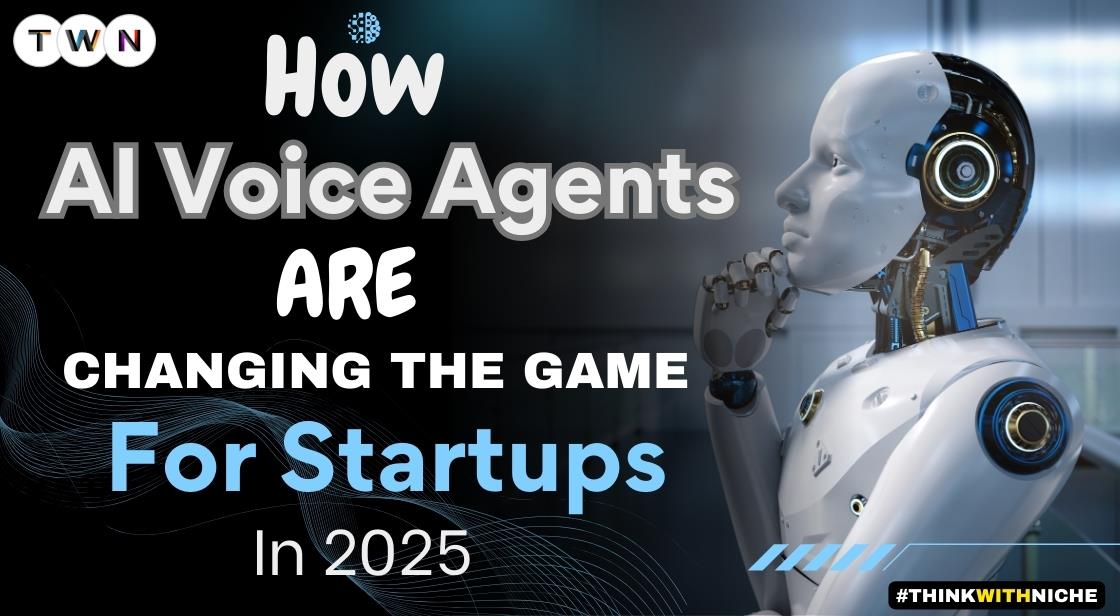How AI Voice Agents Are Transforming Startups in 2025

Blog Post
In today’s hyper-connected, always-on business environment, startups are constantly seeking innovative ways to scale operations, engage customers, and stay competitive. One of the most powerful tools transforming how modern startups operate is AI voice agents. These intelligent, conversational systems are revolutionizing customer interactions by offering 24/7 support, automating routine tasks, and delivering personalized experiences at scale.
Unlike traditional customer service models that require human intervention, AI voice agents provide a cost-effective, scalable, and highly efficient alternative—making them a game-changer for early-stage businesses with limited resources. From boosting sales and improving customer satisfaction to streamlining recruitment and appointment scheduling, startups across industries are leveraging voice AI to accelerate growth and innovation.
In this article, we’ll explore the key benefits of AI voice agents, practical use cases across sectors, and actionable strategies for startups to successfully implement this technology.
How Startups Are Leveraging AI Voice Agents for Success
In today’s fast-paced digital world, artificial intelligence (AI) is revolutionizing industries, and one of the most transformative applications is AI voice agents. These AI-powered tools are redefining customer interactions, streamlining operations, and enhancing business efficiency. As startups and small businesses navigate the challenges of growth and customer acquisition, AI voice agents emerge as indispensable assets.
Recently, I experienced firsthand the fatigue that follows a major product launch. It made me reflect on the importance of AI voice agents. Unlike humans, these agents never tire—they work around the clock, ensuring seamless customer interactions without fluctuations in service quality. In this article, we’ll explore the impact of AI voice agents on startups, their benefits, diverse use cases, and how businesses can leverage them effectively.
The Benefits of AI Voice Agents for Startups
Artificial intelligence (AI) has rapidly transformed business operations across industries. One of the most impactful applications for startups is AI-powered voice agents. These intelligent systems can handle customer inquiries, provide personalized experiences, and streamline operations—allowing startups to optimize efficiency while scaling rapidly.
Unlike traditional chatbots, AI voice agents have evolved to sound more natural, engage in real-time conversations, and integrate seamlessly into various business channels. Below, we explore the key benefits of AI voice agents and how they help startups compete in a fast-moving digital world.
1. 24/7 Availability and Reliability
For early-stage businesses, customer acquisition and retention are critical for growth. One of the fastest ways to lose potential customers is by failing to respond promptly to their queries. In today’s hyper-competitive environment, users expect immediate responses, and any delay can lead them to switch to a competitor.
AI voice agents eliminate this risk by offering round-the-clock availability. Unlike human representatives who require rest, breaks, and time off, AI voice agents function continuously without any downtime. They can instantly respond to customer inquiries, process requests, and resolve common issues, ensuring that businesses maintain a consistent and professional presence at all times.
Additionally, AI voice agents can handle multiple conversations simultaneously, ensuring that high traffic volumes don’t overwhelm the system. This capability is particularly valuable for startups that may not have the budget to staff a large customer support team.
Example:
A growing e-commerce startup specializing in personalized gifts struggled with responding to customer inquiries outside of business hours. By implementing an AI voice agent, the company ensured instant 24/7 support, leading to a 40% increase in customer engagement and a 60% reduction in response time within six months. Customers appreciated the prompt responses, resulting in better retention rates and higher repeat purchases.
2. Multi-Channel Support: Meeting Customers Where They Are
Modern consumers expect businesses to be accessible across multiple communication channels. Whether it's through phone calls, social media, messaging apps, or websites, customers want seamless interactions. AI voice agents offer multi-channel support, allowing startups to engage with users wherever they are most active.
AI voice agents can be integrated across various platforms, including:
-
Websites (Live voice chat)
-
Phone lines (Customer support hotlines)
-
WhatsApp and Messenger (Conversational AI on popular messaging apps)
-
Social Media DMs (Handling inquiries on platforms like Instagram and Facebook)
By being available on multiple platforms, businesses can eliminate friction in customer interactions, improving both user experience and conversion rates.
Example:
A fintech startup offering digital loans noticed that many customers preferred WhatsApp for communication rather than calling or emailing. By integrating an AI voice agent into WhatsApp, its website, and phone lines, the startup saw a 35% increase in customer satisfaction scores and a 20% reduction in customer drop-off rates during the application process.
3. Personalization and Brand Identity
A common misconception about AI voice agents is that they sound robotic and impersonal. However, modern AI solutions have overcome this limitation by offering customizable and natural-sounding interactions. Businesses can:
-
Modify the AI’s tone to match their brand’s personality
-
Adjust responses based on customer interactions
-
Incorporate voice cloning technology for a more human-like experience
Whether a business wants a professional, friendly, or playful tone, AI voice agents can be designed to align with the brand’s identity. This level of personalization enhances customer engagement and makes interactions more memorable and enjoyable.
Example:
A boutique hotel chain implemented an AI concierge service with a warm, inviting tone. Guests could use the AI-powered assistant to:
-
Get personalized recommendations for local restaurants and attractions
-
Make room service requests without calling reception
-
Check-in/check-out via voice command
The result? A 20% increase in guest satisfaction and a notable improvement in online reviews praising the hotel's "high-tech yet personal" service.
4. Cost-Effective Customer Support
Customer service is one of the most resource-intensive aspects of running a startup. Hiring, training, and managing a human support team requires significant investment, often making it difficult for startups to scale efficiently. AI voice agents provide an affordable alternative by reducing the need for large support teams while maintaining high-quality service.
AI voice agents can handle routine inquiries, FAQs, appointment bookings, and basic troubleshooting, freeing up human employees to focus on more complex customer needs. This reduces labor costs while improving response times and service consistency.
Key Cost-Saving Benefits of AI Voice Agents:
✅ Lower payroll expenses: Fewer human agents needed for customer support
✅ Reduced training costs: AI agents don’t require onboarding or continuous training
✅ Scalability: AI agents handle increasing workloads without additional cost
✅ Error reduction: AI ensures consistent, accurate responses, reducing the risk of misinformation
Example:
A SaaS (Software-as-a-Service) startup struggled with high customer service expenses. The company replaced its 10-person customer support team with an AI voice agent, which was trained to handle:
-
Subscription inquiries
-
Troubleshooting steps for software issues
-
Billing and payment support
Within three months, the company reduced customer service costs by 50% while maintaining a 97% customer satisfaction rate. The human support team was reallocated to focus on high-priority technical support cases, improving overall efficiency.
Expanding Use Cases for AI Voice Agents
AI voice agents are revolutionizing business operations across industries. While their most well-known application is customer service, organizations are finding innovative ways to integrate them into various aspects of their operations. These AI-powered assistants are capable of handling complex tasks, reducing human workload, and improving efficiency. Let’s explore some of the key areas where AI voice agents are making a significant impact.
1. Customer Service Automation
Providing exceptional customer service is critical for business success, but maintaining a large team of customer service representatives can be costly and inefficient. AI voice agents solve this challenge by automating responses to frequently asked questions (FAQs), handling complaints, processing orders, tracking deliveries, and troubleshooting common issues.
Unlike traditional chatbots, AI voice agents can engage in dynamic conversations, providing personalized responses rather than rigid, scripted answers. This improves the customer experience and ensures prompt resolutions to queries, even outside of business hours. AI voice agents can handle multiple calls simultaneously, eliminating wait times and reducing frustration among customers.
Example: AI-Driven Food Delivery Customer Support
A leading food delivery platform implemented AI voice agents to provide real-time updates on order status, estimated delivery times, and restaurant inquiries. Previously, customer support teams were overwhelmed with thousands of order-related calls, leading to long wait times. After deploying AI voice agents, the platform saw a 70% reduction in customer service calls, as users could get instant updates without speaking to a human agent. This not only improved customer satisfaction but also allowed human representatives to focus on resolving more complex issues.
2. AI in Recruitment and HR
Recruitment is a time-consuming process, requiring companies to screen hundreds or even thousands of applicants for a single position. AI voice agents are transforming hiring by conducting initial candidate interviews, evaluating responses, and shortlisting the best candidates based on predefined criteria.
These AI agents can ask relevant questions, analyze responses, and assess tone, confidence, and language proficiency. The collected data is then provided to hiring managers, enabling them to make quicker and more informed decisions. AI-powered recruitment tools also eliminate bias and ensure a fair assessment of all candidates.
Example: Mercor’s AI-Powered Interviews
Mercor, a global talent marketplace, has integrated AI voice agents into its hiring process. The company’s AI-powered interview agents conduct live candidate screenings, assessing qualifications, skills, and suitability for roles. By October 2024, Mercor’s AI had successfully conducted over 100,000 interviews, dramatically reducing the time recruiters spend on initial screenings. This has led to a significant acceleration in hiring timelines, allowing companies to secure top talent faster.
3. Sales and Lead Generation
Sales teams often spend a large portion of their time on repetitive tasks like cold calling, lead qualification, and follow-ups. AI voice agents can automate these processes, improving conversion rates and optimizing sales efficiency.
AI voice agents analyze customer interactions, detect buying intent, and personalize pitches based on previous conversations. They can also schedule follow-up calls at optimal times, increasing the chances of closing deals. Unlike human sales representatives, AI voice agents work 24/7, ensuring businesses never miss a lead.
Example: Hyperbound’s AI-Driven Sales Training
Hyperbound, a sales training platform, uses AI voice agents to simulate realistic customer interactions. Sales professionals can practice responding to different buyer personas, objections, and negotiation scenarios. This AI-driven approach has led to a 20% increase in deal closures, as sales teams are better prepared to handle real-world challenges.
Additionally, AI voice agents can be deployed in real sales environments, making thousands of automated calls to potential customers, qualifying leads, and passing high-intent prospects to human sales representatives. This reduces the time wasted on unqualified leads and allows sales teams to focus on closing deals.
4. AI in Healthcare
The healthcare industry is leveraging AI voice agents to streamline operations, improve patient care, and enhance accessibility. AI-powered voice assistants can be integrated into hospitals, clinics, and telemedicine services to provide appointment scheduling, medication reminders, symptom analysis, and follow-up care.
For elderly patients or individuals with disabilities, AI voice agents offer an easy-to-use interface for accessing healthcare services. They can remind patients to take medications at the right time, reducing the risk of missed doses and improving treatment adherence. Additionally, AI voice agents can guide patients through preliminary symptom assessments, helping them determine whether they need to visit a doctor.
Example: AI Voice Agents in Telemedicine
A telemedicine startup integrated AI voice agents to automate appointment scheduling and follow-up calls. The AI agents answered patient inquiries, suggested available time slots, and confirmed bookings. After deployment, the company observed a 30% reduction in no-show rates, as AI-powered reminders ensured patients remembered their appointments. This not only improved efficiency for healthcare providers but also enhanced patient outcomes.
5. Automated Appointment Management
Managing appointments manually can be a cumbersome process, especially for businesses that rely on scheduled services such as salons, auto repair shops, legal firms, and healthcare clinics. AI voice agents simplify this by automating appointment bookings, confirmations, rescheduling, and cancellations.
These AI-powered agents can integrate with business calendars, ensuring no double bookings occur. They can also send automated reminders to reduce no-shows and allow customers to reschedule appointments without speaking to a human representative.
Example: Toma’s AI-Powered Appointment Scheduling for Auto Dealerships
Toma, an AI-powered system designed for auto dealerships, automates customer service calls for booking and modifying service appointments. Customers can call the dealership and interact with the AI agent, which understands their request, checks available slots, and schedules an appointment instantly.
This system has helped dealerships reduce wait times, free up human staff for higher-value interactions, and improve customer satisfaction. The resulting efficiency boost has allowed dealerships to handle more appointments per day, ultimately driving increased revenue.
How Startups Can Implement AI Voice Agents
1. Choose the Right Platform
Selecting the appropriate AI voice agent platform is crucial. Popular options include:
-
Voiceflow: User-friendly, no coding required.
-
Vapi.ai: Supports over 100 languages, ideal for global businesses.
-
PlayAI: Designed for developers needing custom solutions.
2. Train AI for Optimal Performance
AI agents improve with training. Feed them business-specific data, product information, and customer queries to enhance accuracy.
3. Customize for Brand Consistency
Ensure the AI voice agent reflects your brand’s personality, from tone to language style.
Example: A fitness startup customized its AI coach to offer motivational messages and personalized workout suggestions, enhancing user engagement.
4. Monitor and Optimize Performance
Regularly analyze AI interactions, gather customer feedback, and refine responses to improve efficiency.
Example: A legal tech firm fine-tuned its AI assistant based on client interactions, improving accuracy by 25% over three months.
Future Trends in AI Voice Agents
-
Voice Cloning & Hyper-Personalization – AI will soon mimic specific voices for a more tailored experience.
-
AI Emotional Intelligence – Advanced AI will recognize emotions and adjust responses accordingly.
-
Seamless Human-AI Handoff – AI agents will better integrate with human representatives when needed.
-
AI-Powered Market Research – AI voice agents will collect insights from customer interactions to inform business decisions.
Conclusion
AI voice agents are more than just a convenience—they are game-changers for startups looking to scale efficiently. With continuous advancements, businesses that integrate AI-powered agents early will gain a competitive edge. Whether for customer service, sales, or operations, AI voice agents are unlocking new possibilities, allowing startups to optimize resources and focus on growth.
As generative AI continues evolving, the potential for AI voice agents will only expand. Those who embrace these tools now will not only stay ahead but redefine the future of business interactions.
You May Like
EDITOR’S CHOICE












